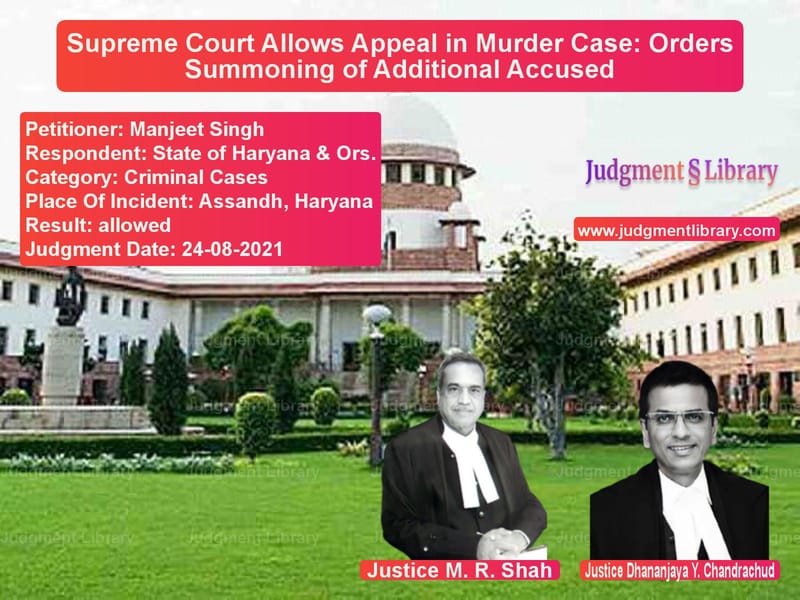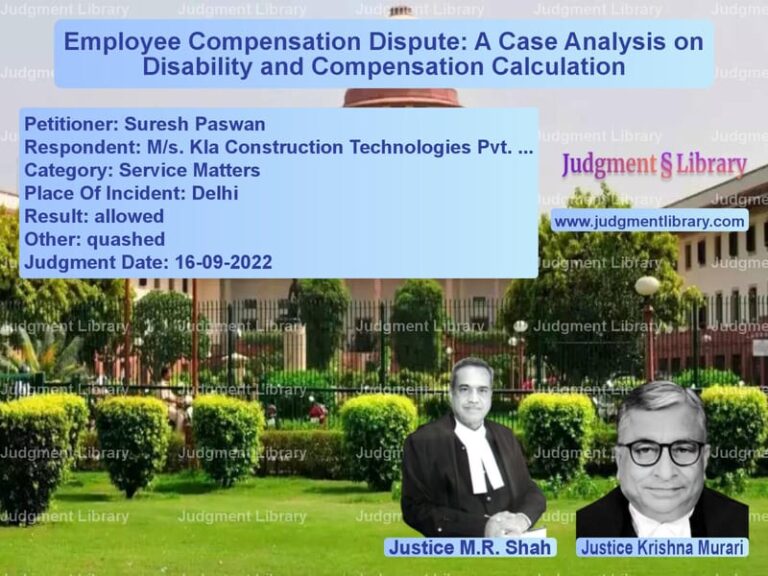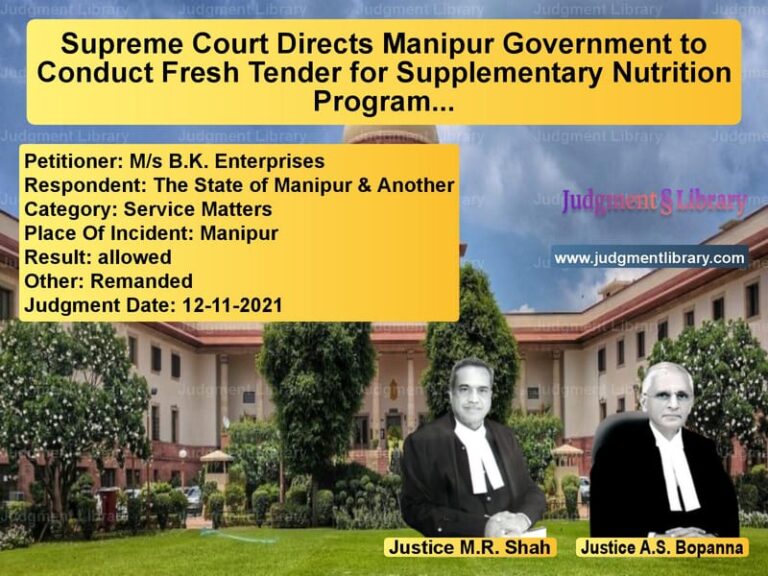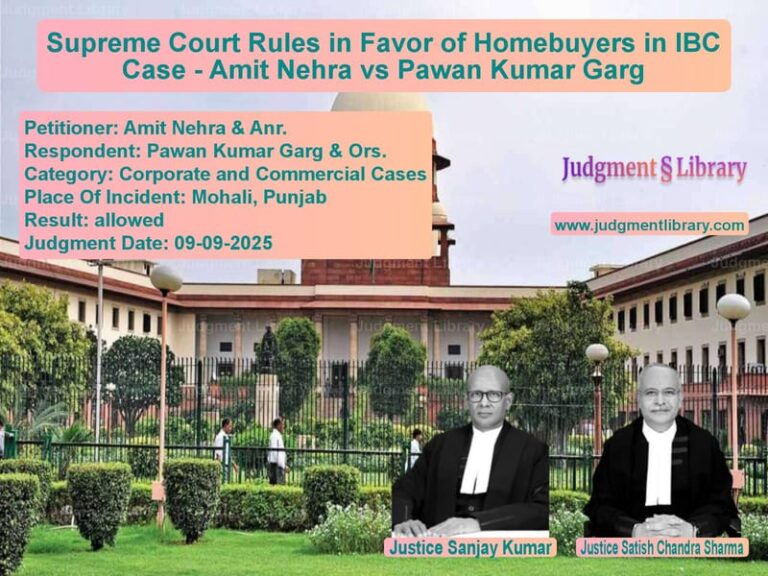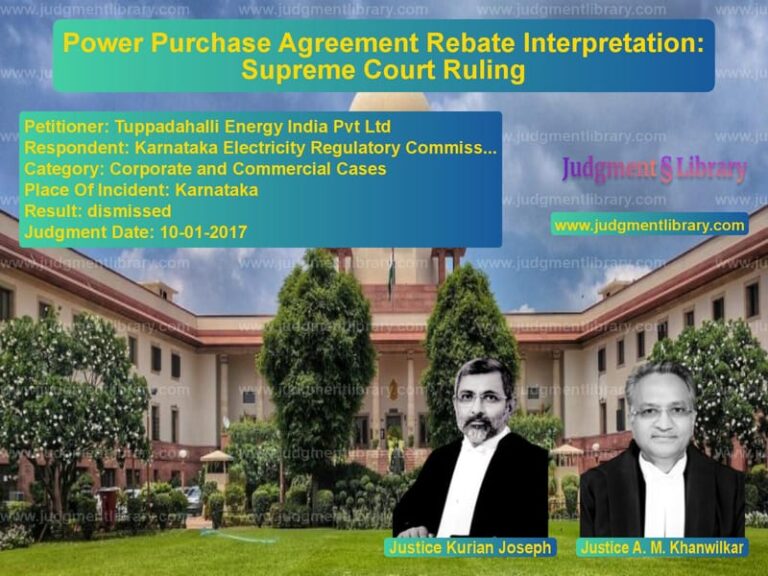Supreme Court Allows Appeal in Murder Case: Orders Summoning of Additional Accused
The Supreme Court of India, in the case of Manjeet Singh vs. State of Haryana & Ors., addressed a significant legal issue concerning the summoning of additional accused under Section 319 of the Criminal Procedure Code (CrPC). The case revolved around an incident of murder and attempted murder, and the Court’s decision clarified the scope of judicial intervention in criminal trials to ensure that all perpetrators of a crime are brought to justice.
Background of the Case
The case originated from an FIR registered at Police Station Assandh in Haryana on July 27, 2016. The FIR was based on a complaint by Rann Singh regarding the murder of his son, Amarjit Singh, and injuries suffered by his nephew, Manjeet Singh (the appellant).
According to the FIR:
- Amarjit Singh and Manjeet Singh were attacked while returning home after purchasing pesticides for their farm.
- The accused, namely Sartaj Singh, Tejpal Singh, Sukhpal Singh, Parab Sharan Singh, and Preet Samrat, blocked their way using a vehicle.
- Sartaj Singh fired multiple shots from his licensed revolver, killing Amarjit Singh on the spot and seriously injuring Manjeet Singh.
Legal Proceedings and Arguments
Following the investigation, the police filed a charge sheet against Sartaj Singh alone, while the other accused were placed in Column 2, indicating that no sufficient evidence was found against them.
Petitioner’s Arguments
Manjeet Singh, the injured victim, challenged this decision and sought the summoning of the remaining accused under Section 319 CrPC. His counsel, Senior Advocate G.S. Gill, contended that:
- The names of all accused were clearly mentioned in the FIR.
- Manjeet Singh, in his testimony as PW1, reaffirmed the allegations against all accused.
- The trial court and the High Court failed to exercise their power under Section 319 CrPC.
- The courts erred in ignoring the statements made in the examination-in-chief of the witness.
- Judicial precedents establish that even a single witness’s testimony can be sufficient to summon additional accused.
Respondents’ Arguments
Senior Advocate R. Basant, appearing for the respondents, opposed the appeal, arguing that:
- The police conducted a thorough investigation, and the exclusion of the other accused was based on findings by high-ranking officers.
- There was no material evidence, apart from Manjeet Singh’s testimony, to implicate the additional accused.
- Section 319 CrPC should be used sparingly and not based solely on allegations.
Supreme Court’s Observations
The Supreme Court, in a detailed judgment, examined the legal principles governing Section 319 CrPC and the circumstances under which additional accused can be summoned during a trial.
1. Power Under Section 319 CrPC
The Court reaffirmed that Section 319 CrPC empowers trial courts to summon persons not named in the charge sheet if evidence during trial suggests their involvement in the crime. The Court observed:
“The duty of the court is to find out the real truth and to ensure that the guilty do not go unpunished.”
2. Role of the Trial Court and High Court
The Supreme Court found that both the trial court and the High Court failed to appreciate the significance of Manjeet Singh’s testimony. The Court emphasized:
“Even a single witness’s statement during examination-in-chief is sufficient to invoke Section 319 CrPC.”
3. Allegations Against the Additional Accused
The Court noted that the accused were specifically named in the FIR with their respective roles. The presence of the accused at the crime scene and their active participation in blocking the road and wielding weapons indicated a common intention.
The Court rejected the High Court’s reasoning that merely being present with weapons did not establish common intention, stating:
“The formation of an unlawful assembly with a common objective is sufficient to attract Section 149 IPC.”
4. Significance of an Injured Eye-Witness
The Court placed great reliance on the testimony of Manjeet Singh, an injured eye-witness. Referring to established legal precedents, the Court stated:
“An injured eye-witness’s testimony carries greater evidentiary value, and unless compelling reasons exist, their statements should not be disregarded.”
Final Judgment
The Supreme Court allowed the appeal and issued the following directives:
- The trial court’s and High Court’s orders rejecting the Section 319 CrPC application were set aside.
- The trial court was directed to summon the additional accused to face trial.
- The accused must be prosecuted under Sections 302, 307, 341, 148, and 149 IPC.
- The observations in the judgment were limited to the summoning stage and would not affect the final trial proceedings.
Implications of the Judgment
This landmark judgment reinforces the principle that all accused in a criminal case should be tried based on available evidence, even if the investigating agency omits them from the charge sheet. The key takeaways from this ruling are:
- Expanded Scope of Section 319 CrPC: Courts can summon additional accused even at an advanced stage of the trial.
- Greater Reliance on Eye-Witness Testimony: Injured witnesses’ statements hold significant probative value.
- Accountability in Criminal Investigations: The ruling discourages arbitrary exoneration of accused individuals by investigative agencies.
- Judicial Intervention in Ensuring Fair Trials: The judiciary can step in to correct investigative lapses and ensure comprehensive prosecution.
With this judgment, the Supreme Court has reiterated its commitment to upholding justice and preventing the miscarriage of law by allowing accused individuals to evade trial due to technicalities.
Petitioner Name: Manjeet Singh.Respondent Name: State of Haryana & Ors..Judgment By: Justice M. R. Shah, Justice Dhananjaya Y. Chandrachud.Place Of Incident: Assandh, Haryana.Judgment Date: 24-08-2021.
Don’t miss out on the full details! Download the complete judgment in PDF format below and gain valuable insights instantly!
Download Judgment: manjeet-singh-vs-state-of-haryana-&-o-supreme-court-of-india-judgment-dated-24-08-2021.pdf
Directly Download Judgment: Directly download this Judgment
See all petitions in Attempt to Murder Cases
See all petitions in Bail and Anticipatory Bail
See all petitions in Extortion and Blackmail
See all petitions in Fraud and Forgery
See all petitions in Theft and Robbery Cases
See all petitions in Judgment by Mukeshkumar Rasikbhai Shah
See all petitions in Judgment by Dhananjaya Y Chandrachud
See all petitions in allowed
See all petitions in supreme court of India judgments August 2021
See all petitions in 2021 judgments
See all posts in Criminal Cases Category
See all allowed petitions in Criminal Cases Category
See all Dismissed petitions in Criminal Cases Category
See all partially allowed petitions in Criminal Cases Category

